53% of black Americans want Black Panther to win Best Picture
This year’s Academy Award nominations, though not as diverse as some others, at least are not #OscarsSoWhite. Three of the eight Best Picture nominees are pictures with major roles for black actors this year, and Spike Lee received his first Best Director nomination. Still, the only two black acting nominations are in the supporting actor category.
The latest Economist/YouGov Poll clearly shows demographic differences in movie viewership and Oscar preference.
Half of all adults say they “never” or “almost never” see movies in theaters. There are huge differences between older and younger adults, and between black adults and white adults, too.
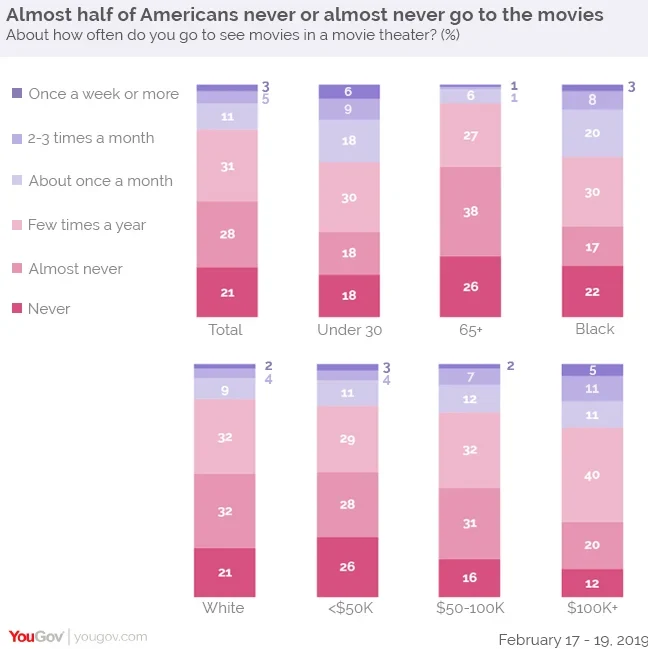
Income matters, too. The better off a person’s family is, the more likely they are to go to the movies.
However, just 10% of adults have seen as many as three of the Best Picture nominees. 54% have seen none of them. 59% of white respondents have seen no Best Picture nominees, while 47% of African-Americans say the same. 74% of those 65 and older have seen none of the Best Picture movies.
More than one in four adults aren’t even interested in seeing any of the Best Picture nominees. So, Oscar preferences are often based on little direct information and are affected by demographic preferences. Even those who have seen none of the nominated movies make a choice for what and who should win.
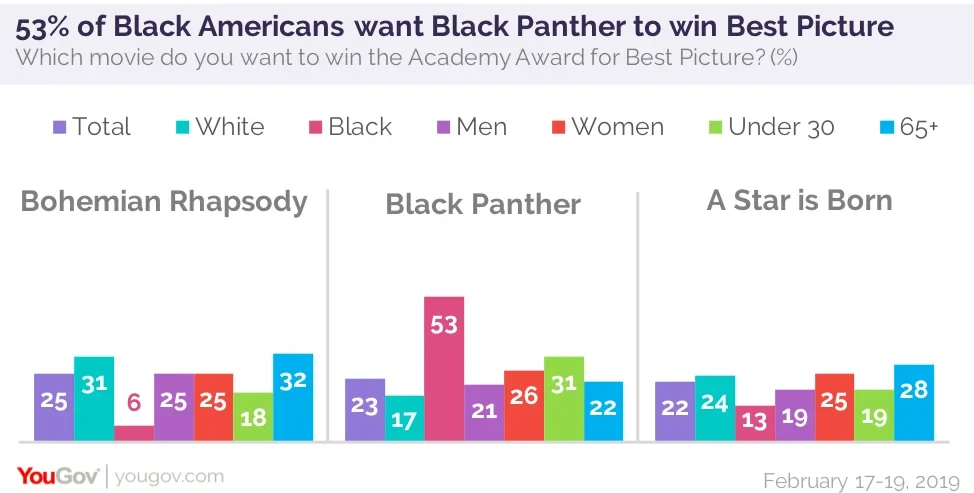
For Americans as a whole, the Best Picture race is a three-way contest among three hit movies: Black Panther, Bohemian Rhapsody, and A Star is Born. All the other nominated movies score in single digits. Men put Bohemian Rhapsody in first place, while women are more closely divided. For black Americans, the overwhelming choice is Black Panther. More than half of blacks choose it.
Eight in ten have seen none of the movies with a Best Actress nomination, and 74% of people have seen none of the Best Actor candidates. There are two favorites for Best Actor: Rami Malek, for Bohemian Rhapsody, and Bradley Cooper for A Star is Born (Cooper has been a fan favorite in the Economist/YouGov Poll before, for his role in 2014’s American Sniper). In this category, black Americans have no clear preference. Older adults choose Cooper, younger ones pick Malek.
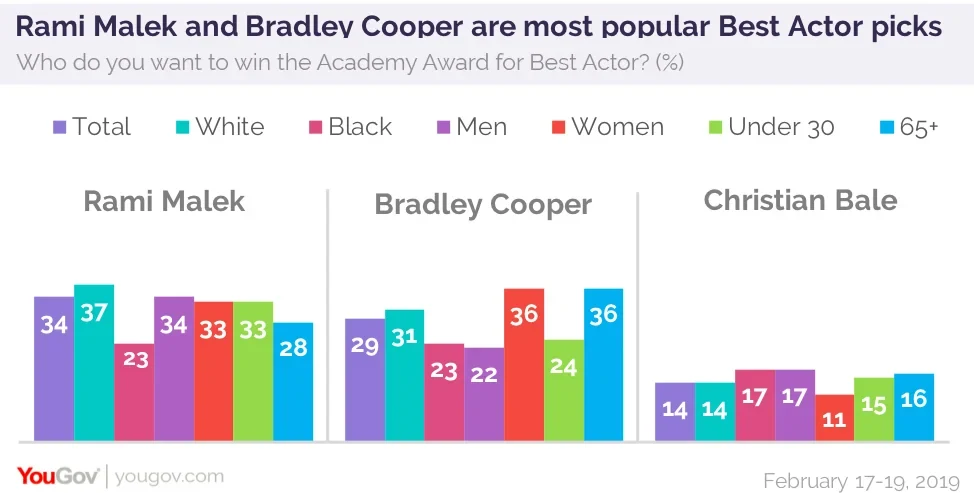
As for the Best Actress category, even though four in five have seen none of the nominees, and nearly half claim they are not interested in seeing any, there is a frontrunner: Lady Gaga for A Star is Born. Melissa McCarthy is in second place for Can You Ever Forgive Me?. Gaga is the first choice of men, women, the young, and of both white and black Americans. Only among those 65 and older is there a contest: as many senior citizens want Glenn Close of The Wife to win as choose Lady Gaga. The Wife has been seen by just 3% of those 65 and older, but more than a third in that group want Close to win. Counting this nomination, Close has been nominated for an Oscar seven times. So far, she has never won.
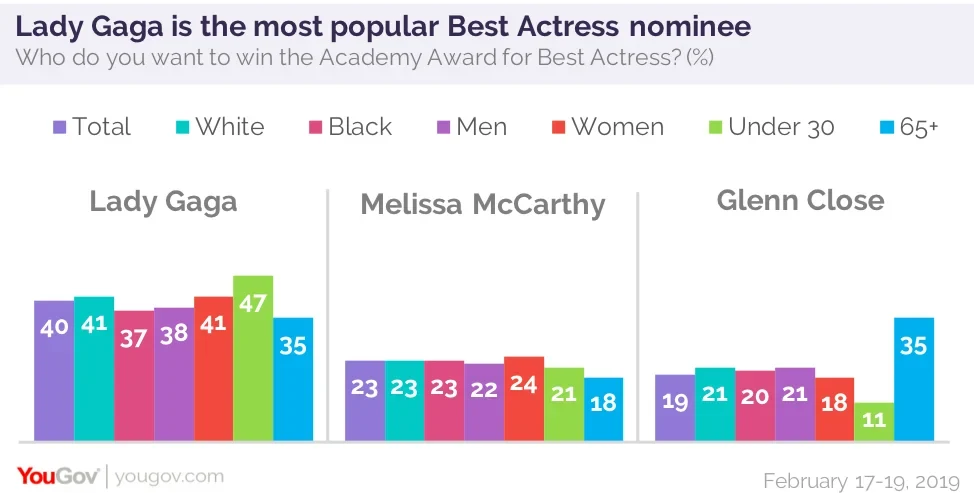
The awards for supporting actor and actress include nominees from movies many haven’t seen. So perhaps it isn’t a surprise that Sam Elliott is the public’s choice for his work in A Star is Born, the most-viewed of the pictures with Best Supporting Actor performances (and the main reason the percentage who say they have seen none of the nominees isn’t even larger). Viewership of the four movies with Best Supporting Actress nominations is even more limited; while 81% have seen none of the Best Supporting Actor movies, 90% have seen none of the Best Supporting Actress films.
Emma Stone won a Best Actress Oscar for La La Land. She is the first choice for the public overall for her role in The Favourite, but she is not black Americans’ first choice. That is Regina King for If Beale Street Could Talk. The other black acting nominee, Mahershala Ali, of Green Book, won an Oscar for Moonlight. But he is not the favorite among black American respondents. Instead, he is in a three-way contest with Elliott and Adam Driver, who appeared in Spike Lee’s nominated film, BlackKKlansman, but is probably best known as Han Solo and Princess Leia’s son in the continuation of the Star Wars movies.
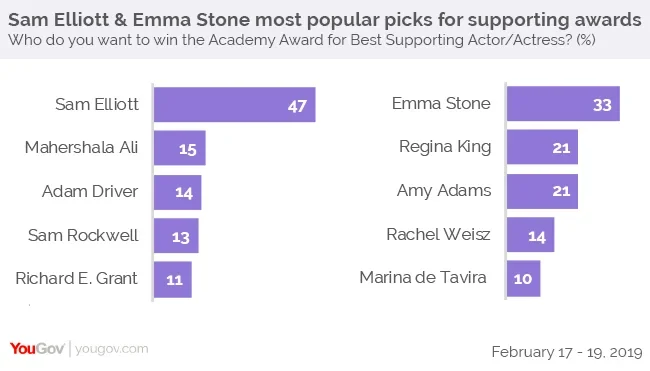
See full toplines and tables results here.
Image: Getty















